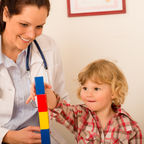 When you think of sex education, the first thing that comes to mind may be a classroom full of giggling and blushing middle school students. But there is clear evidence that the foundations for sex education – and much of what determines adolescents’ knowledge, attitudes and behavior – comes from parents and guardians at home. [Read more…]
When you think of sex education, the first thing that comes to mind may be a classroom full of giggling and blushing middle school students. But there is clear evidence that the foundations for sex education – and much of what determines adolescents’ knowledge, attitudes and behavior – comes from parents and guardians at home. [Read more…]
Sex Education and Parenting: What We Know
Parenting Classes: Helpful at Any Age
 The early bird gets the worm.”
The early bird gets the worm.”
“Begin as you mean to go on.”
“The earlier, the better.” [Read more…]
How to More Effectively Prevent Child Sexual Abuse
Every day, children in the United States experience sexual abuse. It’s difficult to determine how widespread this problem is because child sexual abuse is not uniformly defined and most certainly under-reported. The best data available tells us that more than 25 percent of girls and 5 percent of boys experience sexual abuse at some point during their formative years. [Read more…]
The Evidence on Kids, Sleep, and School Start Times
It’s nearly time for kids across the country to head back to school and that means—for most kids—waking up bright and early. While early mornings are not often problematic for younger kids, tweens and teens often struggle to get up in the morning. [Read more…]
How To Treat the Growing Problem of Childhood Anxiety
 Whether it’s feeling nervous to attend a new school, afraid of a scary looking bug, or scared of the dark, most children experience some form of anxiety. But up to one in three children experience more severe anxiety that affects their ability to learn and socialize. [Read more…]
Whether it’s feeling nervous to attend a new school, afraid of a scary looking bug, or scared of the dark, most children experience some form of anxiety. But up to one in three children experience more severe anxiety that affects their ability to learn and socialize. [Read more…]
What Happens When We Separate Families
 Over the past several months, Immigration and Customs Enforcement (ICE) – a branch of the U.S. Department of Homeland Security – has been separating parents and their children seeking asylum at the U.S. border. In the vast majority of cases, these children have been taken to care institutions while their parents are detained in jail. [Read more…]
Over the past several months, Immigration and Customs Enforcement (ICE) – a branch of the U.S. Department of Homeland Security – has been separating parents and their children seeking asylum at the U.S. border. In the vast majority of cases, these children have been taken to care institutions while their parents are detained in jail. [Read more…]
Why Do Youth Self-Injure?
 Self-injury is defined as harming oneself on purpose, but without the intention of committing suicide. Research finds that about 17 percent of adolescents harm themselves intentionally. Girls are more likely to begin injuring themselves at a younger age, and use more serious forms of self-injury. Boys are more likely to injure themselves when they are high or drunk, or when they are in a social setting. [Read more…]
Self-injury is defined as harming oneself on purpose, but without the intention of committing suicide. Research finds that about 17 percent of adolescents harm themselves intentionally. Girls are more likely to begin injuring themselves at a younger age, and use more serious forms of self-injury. Boys are more likely to injure themselves when they are high or drunk, or when they are in a social setting. [Read more…]
When Parents Read to Kids, Everyone Wins
 It’s no surprise that when parents read to their kids, it helps them succeed in school. [Read more…]
It’s no surprise that when parents read to their kids, it helps them succeed in school. [Read more…]
What’s the Best Way to Treat Mental Health Problems in Kids?
 No one knows for sure, but the U.S. Centers for Disease Control and Prevention estimates that between 13 and 20 percent of youth ages 3 to 17 experience a mental health problem each year. This includes diagnoses of attention deficit hyperactivity disorder (ADHD), anxiety, depression, autism spectrum disorders and Tourette syndrome. [Read more…]
No one knows for sure, but the U.S. Centers for Disease Control and Prevention estimates that between 13 and 20 percent of youth ages 3 to 17 experience a mental health problem each year. This includes diagnoses of attention deficit hyperactivity disorder (ADHD), anxiety, depression, autism spectrum disorders and Tourette syndrome. [Read more…]
The Summer Slump: Do Kids Backslide During Summer Vacation?
Kids across the nation are well into summer days of swimming, day camps and – in many cases – extra time in front of TVs. For most children, this also means less time engaged in educational pursuits like reading, math and problem solving. [Read more…]







